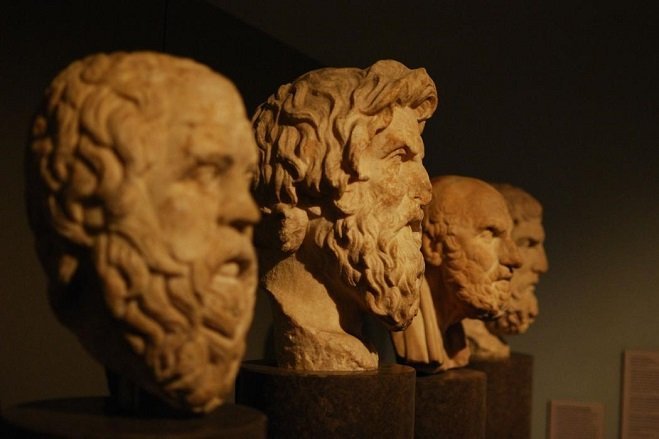The variability of sensory knowledge according to Plato is due not only to the variability and transience of the perceived sensual material objects. In addition to the sensual being, according to Plato, there is also a superstitious, super-spiritual world that can not be perceived sensibly, but to which one can reach and think - it is the mind. Knowledge of this world is a true, mutual knowledge, Plato called "epistimi", understanding, knowledge, knowledge. We have the first kind of knowledge of reason, as in geometry, algebra, or logic. The second type is an immediate, complete, common understanding of something. It is equal to what we now call intuition, immediate inner conviction, contemplation, and rational faith.
According to Plato, this is the highest real knowledge because it is knowledge of the true, eternal, invariable, spiritual being.The beauty itself says that Plato is something eternal: it has not been born, it is not born, it is not born, it can not be said to be beautiful in one respect, but ugly and bad in another, to be sensuously perceived from him, like the beautiful face or the beautiful hand. It does not exist in anything else somewhere, in some animals or in the sky or on earth, but it is forever identical, homogeneous alone of yourself. Everything else we call wonderful is also partisan, but while everything else arises and destroys, beauty itself grows neither diminishes nor changes itself.The word of beauty applies to all ideas. They are absolutely pure, not mixed with anything foreign and opposite. No beautiful object is a complete incarnation of beauty-there are percentages of non-beauty in itself, but beauty as ideas is pure and unimproved. No individual person is a complete realization of humanity, but it is absolute, pure and without an element of something opposite in itself.
Because ideas make what are the specific things that are, and not something else: "horse" makes horses horses, "roseness" makes roses roses, "potato" makes potato potatoes and so on, it is clear that ideas are the cause, source of specific things. Besides, the concrete things realize, they show ideas, even though it is never full. So, ideas are their prototype, the original of which the specific things are copies, imitations - more or less successful. Ideas finally appear to be the ideal, the ultimate goal for concrete things, the ideal of every individual, and more and more, to be more fully in line with the idea of man; the ideal horse is the one who more fully embodies the essence, and so on. But where are the ideas? According to Plato, they exist in a kingdom in this visible, spatial and time-dependent world, immovable and eternal, they are lurking over the world outside space and time - "in the valley of righteousness, in a" clever place "accessible only to the contemplation of the mindless spirits ". And how many ideas are there? They are infinite, because an idea exists for every generic and species concept, for all the specific things. Finally, we have to say that Plato in the realm of ideas has a dominant supreme idea.
This is the idea of good agaton. We have already seen that everything specifically has as its ideal the ever more complete development and realization of its idea. The completeness of being, this is the supreme end of all that exists, this is the supreme ideal of being or its supreme good. And if so, the ever more complete realization of any idea leads to the realization of good and good at the same time. The good in this way is the goal of the goals, the idea of the ideas, the queen of the world of ideas, the first reason of everything that exists, it is the basis and sense of all other ideas: as an absolute ideal, it embraces the sum of all ideas, one.

:) i wish ive read this a long time ago, took a while to understand that on my own.
I realy do not know, what is this?
I upvoted your post.
Keep steeming for a better tomorrow.
@Acknowledgement - God Bless
Posted using https://Steeming.com condenser site.
muy bueno este post... felicitaciones